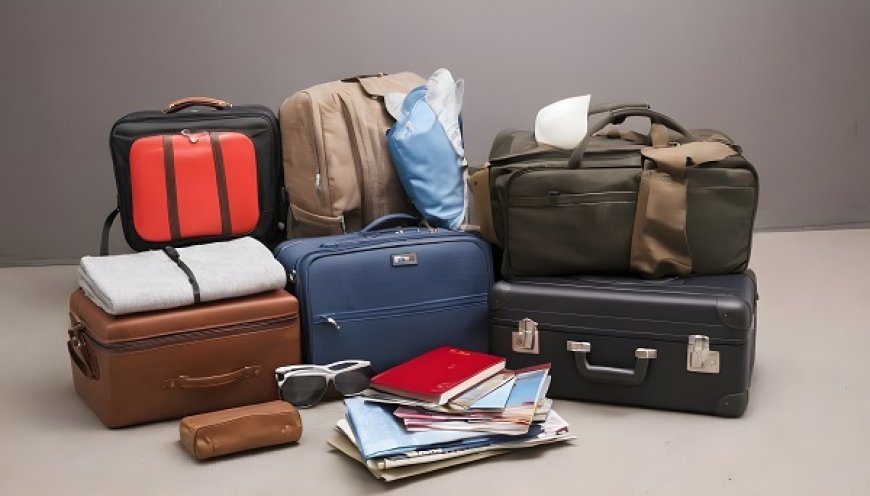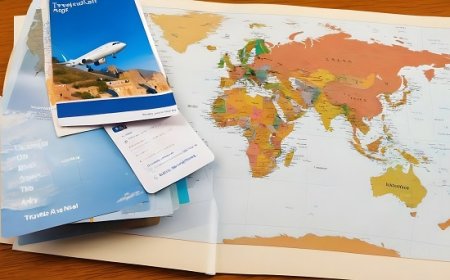Guidelines for Securing Property While Traveling
Securing property while traveling involves utilizing hotel safes, dividing belongings, avoiding excessive display of valuable jewelry, using theft-resistant bags, ensuring luggage security, employing safety locks, refraining from leaving belongings unattended, avoiding ostentatious or conspicuous appearances, keeping backup copies of important documents, staying away from high-risk areas to minimize the risk of loss or theft, and ensuring safety throughout the journey

Securing property while traveling involves utilizing hotel safes, dividing belongings, avoiding excessive display of valuable jewelry, using theft-resistant bags, ensuring luggage security, employing safety locks, refraining from leaving belongings unattended, avoiding ostentatious or conspicuous appearances, keeping backup copies of important documents, staying away from high-risk areas to minimize the risk of loss or theft, and ensuring safety throughout the journey.
Guidelines for Securing Property While Traveling
Securing belongings during travel is of paramount importance to ensure the safety of personal belongings and wealth while on the move.
1. Use of hotel safes: Hotel safes should be used to secure cash, jewelry, and important documents instead of leaving them randomly in the room, as these safes provide an additional level of security.
2. Dividing belongings: Belongings can be divided among multiple locations, such as placing some cash and credit cards in an inner pocket while storing the rest in an easily carried bag, reducing the chance of losing everything in case of theft.
3. Use of theft-resistant bags: There are bags designed specifically to minimize the risk of theft, featuring elements like hidden pockets and zippered compartments protected with passwords, making it difficult for thieves to access the bag's contents.
4. Use of security locks: Security locks can be used to secure your bags and valuable belongings, whether inside the hotel or while on the move, increasing the difficulty of opening them without permission.
Important Tips
Securing belongings during travel requires taking important tips to ensure their safety and protection from loss or theft during your trips.
1. Pre-planning: Before traveling, plan carefully the belongings you intend to take with you and strive to minimize them. Prioritize essential items and avoid bringing unnecessary items that may be prone to loss or theft.
2. Use of safes: Store cash, valuable jewelry, and important documents in the hotel safes in your room, where they provide additional protection and reduce the chances of theft.
3. Proper distribution of belongings: Distribute your belongings between two or more bags, so that in case one is lost, you won't lose everything. It's also advisable to distribute cash, credit cards, and personal IDs among different locations.
4. Use of theft-resistant bags: Choose bags specifically designed to be theft-resistant, which include features like reinforced zippers and strong materials to prevent intrusion by thieves.
5. Use of security locks: Secure your bags and luggage using security locks, whether it's a regular lock or a chip-enabled lock, and keep the lock keys securely.
6. Maintain vigilance while traveling: Stay alert and cautious while moving around and avoid unsafe places. Avoid appearing wealthy or flashy to avoid attracting the attention of thieves.
7. Backup important documents: Upload backups of important documents such as passports, flight tickets, and hotel reservations to your mobile device or email, so you can access them when needed.
Effective Strategies to Protect Your Belongings While Traveling
Effective strategies to protect your belongings while traveling are an essential part of a safe and comfortable travel experience. These strategies aim to reduce the risks of loss or theft and enhance security while on the move.
1. Dividing belongings: Divide your belongings between two or more bags so that you have a backup of essential items in case of loss or theft. For example, you can place some cash and credit cards in a small handbag and the rest in your travel bag.
2. Use of safes: Store cash, valuable jewelry, and important documents in the safes available in the hotel. This provides additional protection against theft.
3. Use of theft-resistant bags: Choose bags specifically designed to be theft-resistant, which include features such as reinforced zippers and strong materials to prevent intrusion by thieves.
4. Securing luggage with security locks: Secure your bags and luggage using security locks, whether it's a regular lock or a chip-enabled lock.
The Basic Steps to Secure Luggage and Wealth During Tourist Trips
Securing luggage and wealth during tourist trips is vital to safeguarding your belongings while traveling.
1. Use sturdy and secure bags: Choose a durable and damage-resistant travel bag, ensuring it has strong and sturdy locks to prevent unauthorized access.
2. Store luggage in a safe place: Upon arrival at the hotel or accommodation, store your luggage in the hotel safe or designated area, ensuring the door is securely closed.
3. Divide belongings: Distribute valuable belongings among your bags, placing some valuable items in your handbag to keep them close to you at all times.
4. Use hotel safes: Store cash, valuable jewelry, and important documents in the hotel safes available in your room, providing additional protection and reducing the risk of theft.
5. Avoid excessive display of wealth: Avoid excessively displaying valuable wealth in public places, as this may attract the attention of thieves.
6. Secure luggage with safety locks: Secure your bags and luggage using safety locks, ensuring the locks are strong and resistant to tampering.
Preparing for Safe Travel
Preparing for safe travel involves a set of measures and precautions that can be taken to ensure your safety and security while on the move. Securing belongings during travel is an essential part of this preparation and can encompass many aspects and steps.
1. Careful trip planning: Before traveling, carefully plan your trip by identifying destinations and places you intend to visit. Check weather conditions and local events to ensure your safety during the journey.
2. Backup important documents: Create backups of your passport, flight tickets, reservation documents, insurance, and any other important documents, and keep them in a secure place such as email or the cloud.
3. Use of hotel safes: Upon arrival at the hotel, store cash, valuable jewelry, and important documents in the hotel safes, and make sure to secure them with a secret code.
4. Use of theft-resistant bags: Choose travel bags specifically designed to be theft-resistant, which include features like protected zippers and hidden pockets.
Securing your belongings during travel
Securing your belongings during travel is crucial for maintaining the safety of your personal possessions and avoiding loss or theft during your trips. The process of securing belongings during travel may involve several steps and measures to ensure the safety of luggage and wealth.
1. Use of hotel safes: Upon arrival at the hotel, use the hotel safes available in your room to store cash, valuable jewelry, and important documents. These safes provide additional protection and reduce the chances of theft.
2. Use of theft-resistant bags: Choose travel bags specifically designed to be theft-resistant, which include features such as protected zippers, hidden pockets, and strong materials.
3. Proper distribution of belongings: Distribute valuable belongings among your bags and avoid putting all valuable items in one bag. You can place some valuable items in a small handbag to keep them close to you at all times.
4. Use of security locks: Secure your bags and luggage using break-resistant security locks, ensuring they are durable and resistant to tampering.
Traveling Safely
Traveling safely requires taking various measures and steps to ensure the traveler's safety and the safety of their belongings during the journey. Securing belongings during travel is an essential part of this process, as it helps prevent loss or theft of luggage and personal wealth.
1. Pre-planning: Safe travel begins with careful trip planning, including selecting suitable destinations and gathering necessary information about potential destinations. Safe accommodations and secure activities should also be identified.
2. Secure document carrying: Important documents such as passports, travel tickets, and credit cards should be carried in a safe and protected place, such as a personal bag or inner clothing pocket.
3. Use of hotel safes: Upon arrival at the hotel, store cash, valuable jewelry, and important documents in the hotel safes available in the room, and ensure to change the safe access code.
4. Proper distribution of belongings: Distribute valuable belongings and personal items among different bags, avoiding putting all valuables in one bag, and ensure to carry essential items in a small handbag close to you.
5. Use of secure locks: Use break-resistant travel locks to secure bags and luggage, and ensure that items inside the bags are well secured.
6. Maintain vigilance and awareness: Always remain vigilant and cautious while moving around, avoid leaving luggage unattended in public places, and refrain from excessive display of wealth.
Summary
Safety of belongings during travel is of utmost importance for travelers, requiring adherence to security guidelines to reduce the risks of loss or theft. Travelers should use security locks to secure their bags and belongings, and utilize hotel safes to store cash and valuable jewelry. It is also advisable to distribute belongings among different bags and avoid excessive display of wealth. Using theft-resistant bags and maintaining vigilance and awareness during travel are also important factors. By following these guidelines, travelers can achieve greater security for their belongings while traveling.
Sources
1. Travel and Tourism Website
- Provides comprehensive information about travel, including tips for securing belongings during travel and security procedures.
2. Travel Insurance Website
- Offers information about the types of insurance available for travelers and how to choose the appropriate insurance to protect belongings during travel.
3. Centers for Disease Control and Prevention (CDC)
- Provides important travel health tips and guidance, including advice on securing belongings and safety.
What's Your Reaction?




































































































































































